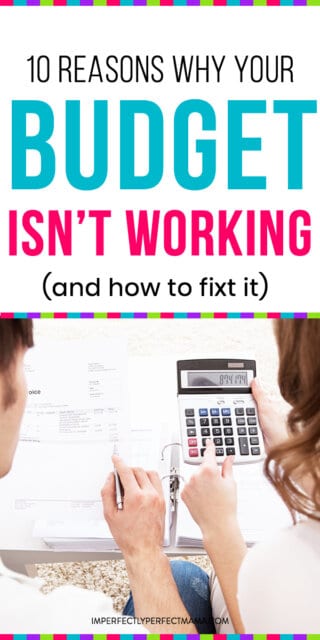Making a budget is a very important step in taking control of your money and finances – but following it is no easy task.

If you’re like many moms, you’ve created a budget and tried to follow it only to have it fall apart within a couple of months.
Using it is hard.
You may just think your budget is failing because you suck at it, but the truth is there are many reasons why it’s just not working.
Here are 10 of those reasons and how you can fix your budget to find financial success:
1. You Keep Giving Up
The thing with making budgets is that you probably won’t see results in the first 3 months. That’s because in order to make an accurate and realistic estimate of where your money should go, you need to know where it’s going first.
I could easily say that I’ll budget $150 per month for groceries – but what if I’m actually spending $300?
A cut that big may not be that realistic but I can’t make a judgment call on a grocery budget without knowing what I normally spend.
That’s why it’s important to know where your money is going before you adjust your spending. Take the first 3 months of your budget as an opportunity to build a financial picture of where and how your money is spent.
2. You Spend More Than You Make
Obviously, if more money is going out than is coming in, you are not going to have any.
If this is the case, it’s likely you are living pay cheque to pay cheque or relying on borrowed money to survive.
Doing the 3 months of tracking is probably going to be an eye-opener to you. You may feel that a budget is pointless and you’ll never get ahead, but you may just be overspending money.
Otherwise, you will really have to think hard about your current source of money and lifestyle. If a budget can’t help you create a better financial balance, you may have to make some big changes.
3. You Spend More Time Making a Budget Than Following It
Guilty party, here. I love making forms and checklists and binders full of beautiful organizational information – but the love tends to stop there.
I enjoy compartmentalizing my life into manageable tasks but I struggle actually following what I have created.
While you may find some joy in making your budget, you’re probably not going to feel as joyous following it.
You can add some fun to your budget by creating visuals in order to display your progress. Think bullet journals, beads in jars or thermometer images to track your savings.
For example, you can place a bead or marble in a jar for every $10 you save and watch the jar fill up – or draw a thermometer on a board and fill in your progress (picture the thermometer image a lot of charities use to track donations).
Even bullet journals can make budgeting seem less like work and more like creative expression. You can check out some bullet journal ideas here.
4. Your Budget is Not Accurate
When you create a budget, it’s important to make sure you include absolutely everything – especially when it comes to your expenses.
While you may round up your purchases or guesstimate in certain budgeting areas, forgetting important expenses will throw your budget out of whack.
Pay close attention to annual expenses that don’t occur on a monthly basis such as property insurance or credit card fees. You want to make sure you note when they are paid and the amount.
The last thing you want is to get hit with an annual fee that you weren’t expecting. To circumvent this issue, write down annual expenses in your budget every month, even if they aren’t due that month. This will keep those expenses fresh in your mind each month.
You may also want to put away a little bit of money every month to cover these expenses when they are due. This will prevent having to work in one large expense into one month of your budget.
5. You’re Going Off Track
The one thing you are going to struggle with when it comes to budgeting is self-control. Now that you’re trying to curb your spending, you’re going to have to start saying “no” to unplanned purchases.
This can be very, very hard and you may find yourself going off track because of it.
The best way to avoid this is to dig deep to the root of your unplanned spending. Are you an emotional shopper? Are you tempted by ads? Do you spend money to fit in with your social group?
It may be a challenge, but avoiding temptation is the best way to prevent overspending.
Also, don’t cheat on your budget. You may think that overstating your income and understating your expenses is harmless but it will only create a false sense of accomplishment. In the end, you’ll only be cheating yourself.
6. You’re Not Regularly Tracking Your Spending
The point of making a budget is to actually follow it – and this won’t work if you’re not tracking your spending.
Yes, it’s easy to jot down your income and expected expenses (such as your phone bill or rent).
Yes, it sucks having to write down every single purchase in order to keep track of your spending.
It may feel like a time consuming chore but it is an important one. You can make it less chore-like by doing these two things:
- Write down spending in general categories. For example, don’t write down every item you bought at the grocery store. Just write down the total under “groceries”.
- Try to jot down your spending on a daily or weekly basis. Don’t wait until the end of the month to track all your purchases.
If you only spend from a chequing account, use your online banking app to see where you made your purchases and the amount. That way, instead of rifling through receipts, you can see everything on one screen.
7. You Set It and Forget It
Budgets are not stagnant contracts – they need to be fluid to accommodate changes in your life.
If you try to stick to a budget too strictly, you will get frustrated and disappointed and are more likely to throw the entire thing in the trash.
As soon as something changes in your life, whether the amount of a bill goes up or your income increases, readjust your budget to reflect these changes.
The sooner you do this, especially if your outgoing money is going to increase, the easier it will be to stay on track.
Even if you are bringing in more money, change your budget to accommodate the increase in income. While it may be nice to have the extra cash, you could be using it to build your savings or purchase a larger grocery order.
8. You Didn’t Budget Any Fun Money
If your budget is too restrictive and doesn’t allow for any enjoyment in your life, you’re going to throw in the towel right quick.
We are humans. We like to do things. We like to buy things. We like to spend money.
And we should be able to, within reason. That’s why including fun money in your budget is important.
It allows you to experience the high of attaining things, or going out and doing things, while keeping the money spent under control.
You obviously want to maintain priorities when it comes to expenses, so be sure to allocate fun money only after more important aspects of your finances have been considered.
Look at skimming some money from more flexible areas of spending such as clothing, gifts and household items.
9. You Forgot An Emergency Fund
Whoopsie-doodles. Don’t forget that emergency fund – because the last thing you want to happen is a financial emergency throwing your entire budget into a tailspin.
Owning a car, for example, is the number one reason I would suggest having an emergency fund.
If something breaks and needs repairs, you absolutely do not want to try and make that money work by pulling it from your grocery fund or other aspect of your budget.
It creates the dreaded domino-effect: You take money from your grocery fund to fix the car.
Then you have no money from groceries so you decide to let one bill go for the month (you can pay it up next month) so you can buy food. Well, next month something else happens and you need additional money for another emergency.
Eventually, you can’t get caught up.
Do yourself a favor and put aside however much you can each month into an emergency fund. Even if it’s $20 a month, you’ll appreciate that money when you desperately need it.
10. It’s Too Much To Handle
I know all too well what it’s like to become overwhelmed by money issues. Often I have looked at my budget and, feeling like a failure, have been tempted to light the entire thing on fire.
When our hopes and goals become shadowed by doubt and fear, we tend to throw our hands up and say, “What’s the point?”
Before you become consumed by self-doubt and frustration, reevaluate your budgeting goals. Are they actually attainable?
If you left a full-time job to work part-time and launch your blogging business (Hi!), then dreaming of a down payment on a mortgage in the next year is unrealistic (trust me).
A more realistic goal may be to establish a savings account and make regular payments into it. For example, my current goal is to pay $100 a month into my savings for emergencies. Beyond that, I plan on paying my bills and putting food on the table.
It may not seem like a glamorous goal, but for now it’s realistic and attainable.
If you need to reevaluate our budgeting goals, follow the SMART approach:
- Specific
- Measurable
- Achievable
- Relevant
- Time-based
Making SMART goals means knowing exactly what your goal is, being able to measure progress, making it realistic and personal and having a time-frame in which to achieve it.
Budgets Are Not Impossible
Sometimes it just takes time to get it right. Do you have any great budgeting tips? I’d love to hear them in the comments below!




Leave a Reply